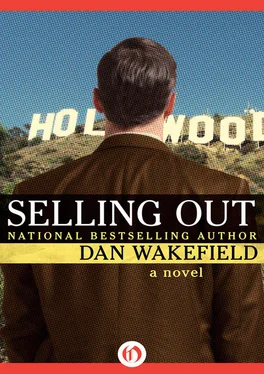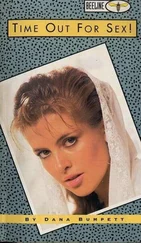“Please,” Ned said, nodding.
Melinda first reached in her mouth and pulled a wad of gum from the back recesses, examined it critically, then stuck it under the chair. She closed her eyes a moment, took a deep breath, and pulled herself up so straight her spine was like a rifle placed against the chair’s back. When she opened her eyes they were suddenly alert, excited. She smiled, and looked delighted by life, as if she found every aspect of it fascinating. When she spoke, her voice was warm, winning, energetic, not quite breathless but spirited, the voice of someone who was not only interesting but interested, and it was edged with that unmistakable, slightly nasal, r-softened sound that signals “preppy.”
Perry recognized this voice at once, though he had never heard it before, except in his imagination.
It was the voice of Laurie.
By the end of the reading, this magical person had somehow so transformed herself that she even looked like Laurie—not the way the character was described in the words of the story, but the way it now seemed she ought to look, in living flesh and gesture.
When the reading was finished and Ned and Kenton thanked the actress, she slumped back down in her seat, reached to pull the wad of gum from beneath it, popped it back in her mouth, and shambled out of the room.
“How about that?” Kenton asked with a grin.
“Well, author,” Ned said to Perry, “you should know—was that Laurie?”
“How did she do that?” Perry asked in a stunned voice. “What happened?”
“You just saw an actress,” Ned explained.
Melinda Margulies was Laurie.
The next day Ned invited Perry to come down to hear a second reading for the part of Jack by an actor named Ronnie Banks.
A bit offbeat and quirky, Banks possessed great quantities of natural boyish charm as well as a wicked, spontaneous wit. He was obviously perfect for Jack, except for one hitch. He was short.
His bio said he was 5 feet 7 inches, but even that was a slight exaggeration. That was all right when they first had him in to read, but that was before they knew Melinda Margulies, the 5 foot 10 inch linebacker, was going to be Laurie.
Ned thanked Ronnie for coming in again and said they’d be in touch. When the hopeful young actor left the room Kenton Spires said softly, ruefully, “Shit.”
“When Melinda wears heels, he won’t even come up to her chin,” Ned sighed.
“We can put him in lifts,” said Alton Saxby.
“And stand him on orange crates during love scenes,” Kenton said. “We’ll never be able to shoot their feet.”
“We’d look like the goddam ‘Muppet Show,’” Ned groaned.
“I think they have feet now, too,” said Perry, wanting to make a contribution, adding as the others turned to stare at him, “the Muppets, I mean. Have feet?”
“We got the right people of the wrong heights,” Ned lamented, evidently ignoring Perry’s observation.
Alton stood up and began to pace in an opposite direction from Ned.
“If we put him in lifts,” Alton said, “maybe even cowboy boots, and kept her in flats all the time …”
“Why would a woman wear flats all the time,” Ned asked, “unless she’s got a gimpy leg?”
Perry cleared his throat and, fearful he might make a fool of himself, spoke in a rush.
“A woman might fall in love with a man even though he’s shorter than she is, and if that were the case, she might simply want to wear flats to make him feel more comfortable about their difference in height. I imagine it happens sometimes.”
The others turned to Perry and this time looked at him as if he’d just invented the light bulb.
“That’s it!” Ned said, snapping his fingers.
“Beautiful,” Kenton said. “Gives a whole new dimension to the relationship.”
“And it’s true to the two of them,” Ned said excitedly. “It’s almost symbolic of their love—kind of awkward, offbeat, giving, considerate …”
“I’ll get them both back in tomorrow morning,” Alton said, “and we can see how they look together. How they play off each other.”
“Perfect,” Ned said. “We’ll know right away if it works.”
It was magic.
“The network didn’t go for it,” Archer said flat out. “They think a tall wife and short husband is strictly sitcom stuff.”
Kenton moaned, putting his head in his hands.
Ned exploded, rising off the floor of Archer’s office like a rocket.
“The frigging Neanderthals!” he screamed.
“Besides,” Archer said, “they’ve got Hal Thaxter under contract and they want to see him in this part.”
Hal Thaxter was a burly blond macho type with a toothpaste ad smile and a high “TVQ.”
Perry had just learned that a TVQ was a significant computerized personal rating of how popular an actor was with the American television audience. By virtue of his appeal as a mindless lifeguard in “Beach Bonanza,” the long-running series of a few years before, Thaxter had a high TVQ and was thus regarded as a valuable element for a new, untried show.
“You ought to be pleased that the network wants him in your pilot,” Archer said. “It means they’re behind it.”
“It also means they don’t get the point,” Ned Gurney yelled. “And it further means you let us down when you said you were all for Ronnie Banks and you’d back us on him all the way!”
As Ned’s face grew redder, Archer’s grew whiter. Perry for a moment wondered if the younger man was going to shrink before the older man’s fury, but Archer Mellis became almost frighteningly rigid and frigid, a major of military bearing and command whose voice came out in saber strokes.
“I put myself on the line for you with Kenton, and I won that battle. I did the same with Ronnie Banks, and I lost. This is not Broadway, this is network television. If you don’t like the way it plays, I recommend you look for more congenial action elsewhere.”
Perry held his breath. Kenton Spires closed his eyes. Ned Gurney, his face not only red but puffed to the point of explosion, exhaled, then nodded.
“I hear you,” he said.
“And that’s the bottom line, amigo .”
“Of course. I understand.”
Ned extended his hand to Archer, who gave it a quick grip.
The meeting was over.
Ned, Kenton—and Perry, too, of course—calmed down and came to the conclusion that Hal Thaxter would be just fine as Jack. There was no sense in being down on an actor because he was handsome and had a high TVQ.
In fact, Ned said that casting the leads so well was cause to celebrate, and anyway, everyone needed to relax a bit, so he was having a little dinner at his house Friday night. Perry was of course delighted at the prospect of seeing the executive producer’s home, as well as meeting his girlfriend. The only disappointment was that Jane wouldn’t get back till the next day. He hated to have her miss this first social occasion with his new colleagues, and, in fact, he felt a bit uncomfortable about going alone. He realized it would be the first time in five years that he’d gone to a real party without Jane. He almost felt guilty, as if it were a small betrayal. He tried to call her just before going to Ned’s, but there wasn’t any answer. It was seven o’clock, which meant ten in Vermont. Where the hell was she? Should he try to reach her at the Cohens’?
Hell, he told himself to relax and enjoy, which Jane would want him to do anyway. He poured a small glass of wine and drank it before leaving, feeling better and thinking he’d remember every detail of the evening so he could tell Jane all about it.
As Perry approached Ned Gurney’s beautiful Spanish-style house in the Hollywood Hills, he thought it was a shame that it pressed so close to another one. But as he entered the interior courtyard he realized that what he thought was a second house was in fact a wing of the main house. He wondered if such grandeur meant the place qualified to be officially called a villa. He sure as hell wasn’t going to show his hick ignorance by asking Ned, but he looked forward to discussing it with Jane. He also wondered if she would agree with his theory that Ned didn’t have a swimming pool because it would seem too Hollywood, and that the elegant interior courtyard was more Eastern, even more intellectual than a pool would have been.
Читать дальше












